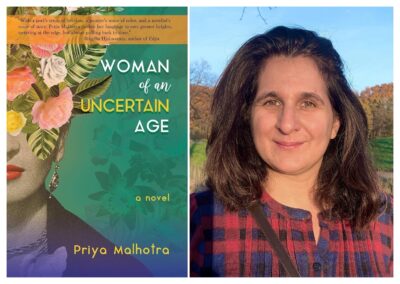
Priya Malhotra‘s debut novel, Woman of an Uncertain Age, is bound to ruffle a few feathers. Those of us who enjoyed her refreshingly honest and out-of-the-box protagonist sure hope that is the case. Following the story of Naina, the book explores the life of a woman widowed in her early fifties, looking to find and recreate herself after the loss of her husband. With vivid imagery, rich dialogue and multiple Desi pop culture references, the author pulls you into the life of a woman struggling to navigate an entirely new life with all the trappings of a new career, societal judgement, love, sex, self-discovery and more. With a peak into Indian immigrant life, arranged marriage, and the uncertain terrain of midlife, this “coming of age” story is an insightful and memorable read. We sit with the writer and former journalist to talk more about her book.
How did the idea of this book come about? Was it inspired by a woman you know?
The origin of my novel stems from a chance encounter with an Indian-American girl at a wedding in America several years ago. Raised comfortably in the United States with a professional father and a stay-at-home mother, the girl offered insights into a family that, like many Indian families in the U.S., blended tradition with modernity. She began revealing intriguing aspects of her life as we spoke: her father’s recent demise and her mother’s unanticipated romantic involvement. The image I had of her mother, a motherly and straitlaced Indian woman in her fifties with neatly tied long hair, suddenly included a boyfriend.
This revelation caught me off guard. It was rare, especially within Indian culture, to hear of a woman her age, with adult daughters of marriageable age, engaging in a romantic relationship. Attempting to conceal my amazement, I inquired if her mother had always been progressive. “No,” she replied. “After my father died, something in her broke loose.”
Intrigued, we continued our conversation, and the narrative took another surprising turn when the girl shared an incident where her mother approached her not as a daughter but as a therapist. Despite the daughter’s initial reservations about the appropriateness of the discussion, her mother insisted, expressing a lack of alternative confidants. Then came the shocking revelation. Her mother divulged a particular aspect of her intimate relationship with the boyfriend – something he enjoyed but hesitated to reciprocate. The daughter was sought out for advice on navigating this sensitive situation.
I was utterly stunned. Such candid discussions between any mother and daughter, but especially one that involved a middle-aged Indian mother, was beyond the realm of anything I’d ever heard of. Following the wedding, we parted ways, but my thoughts lingered on the enigmatic mother. Who was she? Why seek advice from her daughter instead of a therapist? What were the dynamics of her marriage? What fueled her courage to pursue a romantic relationship, and how open was she about it among other Indians? This woman, whom I had never met and had no further details about, became a canvas for my imagination. She was the seed that blossomed into the character of Naina, the protagonist of my novel, even though Naina’s story diverged significantly from that of the girl’s mother.
Are women’s lives in fiction often tied up neatly into acceptable stories with proper endings? How important is it to push that notion and write real, flawed, struggling characters who push the boundaries of “acceptability”?
I think it’s fair to say that a considerable number of novels have historically depicted women’s lives in traditional roles, portraying them as good mothers, daughters, and wives who embody virtues like selfless sacrifice, nurturing, and caregiving. Historically, many times when female characters intended to be seen as respectable stray from conventional norms, they rarely stray far enough to become disreputable. Of course, this is a huge generalization, and there are many exceptions to such types of stories.
Meanwhile, in the not-so-distant past, female characters who significantly deviated from societal norms by engaging in premarital sex, adultery or prostitution, defying expectations of marriage and family or behaving in any way considered immoral faced harsh consequences. Many such women had tragic endings, including death from disease, suicide or violence, some gruesome form of punishment or extreme social ostracism. Once again, this highlights how the portrayal of women’s lives in fiction has been neatly confined within an acceptable framework.
While fiction has historically adhered to the patterns I’ve mentioned to a large extent, the evolution of literature in the modern era began to see a shift towards more complex and diverse portrayals of women. Contemporary authors have challenged traditional norms even further, presenting female characters with unconventional journeys and surprising resolutions. It’s important to keep pushing the limits of acceptability and propriety further, and I feel confident that we will see more of that going forward. As far as fiction depicting struggling female characters is concerned, I haven’t noticed a big dearth in that area. I have read and seen many books and memoirs chronicling the various challenges faced by women. But I haven’t read too many books about the struggles of middle-aged and older women, and we should have more of them.
But what I would really like to see more of is fiction depicting flawed (not evil) female characters who, like most of us, have good qualities but also a dark side. Female characters have traditionally been portrayed as one-dimensional characters such as victims, angels, femme fatales, martyr-like mothers, etc. However, more nuanced and diverse depictions of women have increased in recent years. But I’d love to see more flawed women in literature because by showing their good, bad and ugly sides, we’re embracing women’s rich, complex humanity and deconstructing reductive stereotypes.
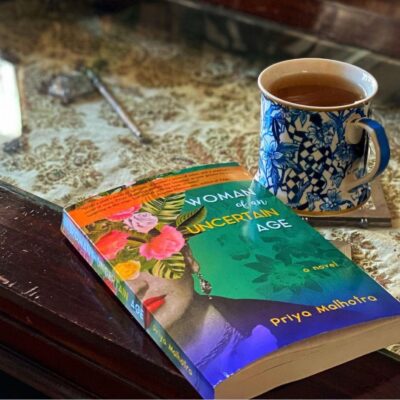
You touch upon the idea that “Self-discovery” is time-bound by society, something meant for younger people, whereas in life, one should be encouraged to “find” oneself at any stage and age. Can you speak a little about that?
“Coming-of-age” is often seen as a ritual for the young, but life’s journey towards self-discovery isn’t confined to the late teens or 20s. Our inner selves are multi-layered, and the process of unravelling these layers is ongoing. In our youth, we begin to explore aspects of ourselves, but new experiences and age bring forth additional layers. The thirst for self-discovery morphs into different forms, urging us to find ourselves anew at various stages of life. It’s a lifelong journey, not bound by age, as we navigate the evolving dimensions of our identity and seek authenticity in every chapter of our lives.
Your protagonist, Naina, extends herself through tragedy and discomfort, and well past her comfort zone. What do you want readers to take away from her journey?
Ideally, readers should view Naina’s journey as both inspiring and a bit cautionary because it shows the highs and lows of breaking free from the familiar. On the one hand, Naina adapts to city life, rises in the competitive New York City art world, and explores new relationships. But this freedom also leads to unexpected consequences, testing her principles and morals. I don’t want “Woman of An Uncertain Age” to hand out a simple inspirational message. I want readers to dive into the rollercoaster of Naina’s journey and think about how we behave in uncharted territories. In my view, it’s a tumultuous dance between newfound freedom, desire, and the repercussions of pushing past boundaries. My novel will hopefully invite readers to contemplate the complexities of personal transformation as they delve into a journey that’s meant to be both liberating and challenging, as well as an exploration of what could happen when we adapt, desire, and face the unpredictable.
Did you discover anything about yourself while writing this book?
I learned how hard it is to write an entire novel, harder than I had ever imagined. I discovered how insanely particular I was about every word and image that went into the book, a significant departure from my generally messy self! 🙂
The process of writing the novel underscored how much I love beautiful and lyrical language and how exciting it is when a phrase or a sentence suddenly comes together beautifully. I also discovered how much I loved delving deep into the inner lives of my characters. That was the most fascinating and rewarding part for me. I’ve always loved psychology, but I didn’t exactly know much I would enjoy excavating the labyrinth of thoughts, feelings, delusions and contradictions in the minds of my characters, particularly my protagonist Naina Mehta.
Which five books or five authors would you recommend we keep on our bookshelves (apart from yours, of course)?
The Dream Builders by Oindrila Mukherjee, My Dark Vanessa by Kate Elizabeth Russell, Eleanor Oliphant is Completely Fine by Gail Honeyman, The Laughter by Sonora Jha, and More Than You’ll Ever Know by Katie Gutierrez.
And, finally, how do you take your coffee?
Iced, always iced, strong and sweet.
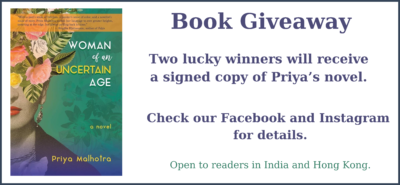
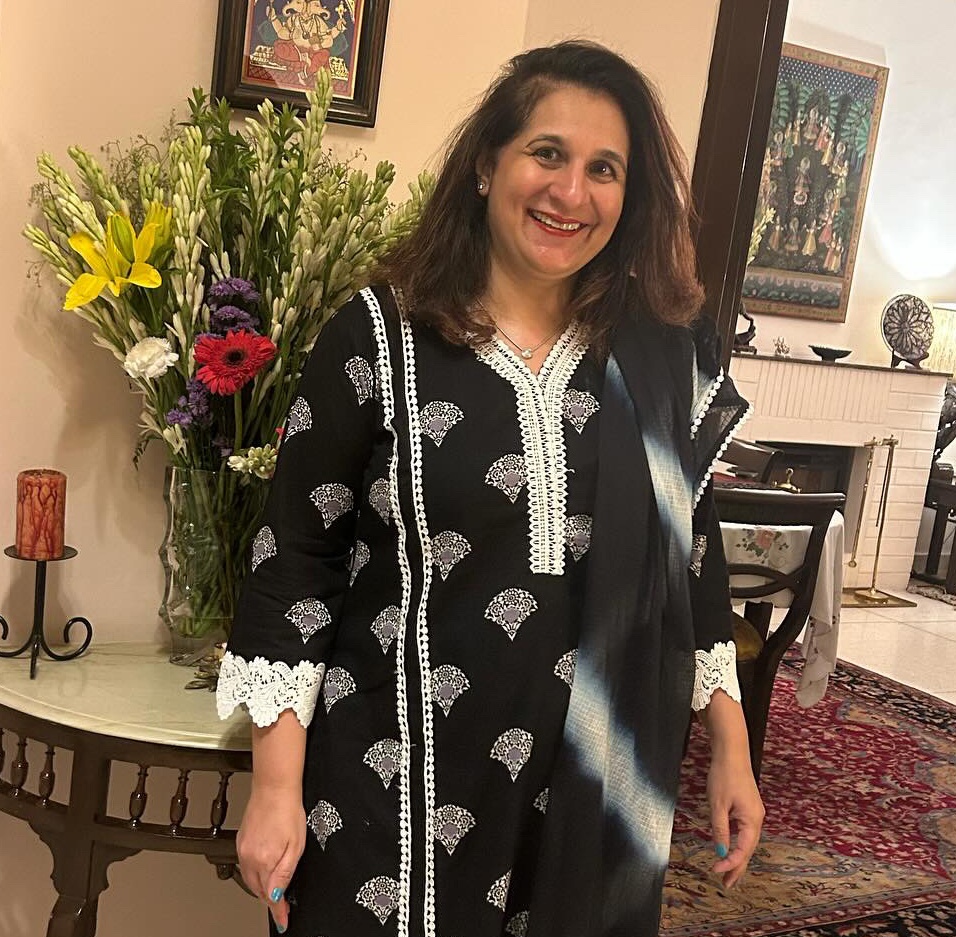
Priya Malhotra
Priya Malhotra has been a writer and journalist in New York for more than 20 years and has contributed to Newsday, Time Out New York, The Times of India, The Japan Times, Asian Art News, Cosmopolitan and News India Times. She has a Master’s degree in journalism from Columbia University in New York City and a Bachelor’ s degree in English literature from Kenyon College in Gambier, Ohio. Woman of An Uncertain Age is her debut novel.
She is represented by Jennifer Lyons of Jennifer Lyons Literary Agency whose clients include luminaries such as Jesmyn Ward who made history by becoming the first woman and African-American to win the National Book Award for fiction twice. The agency also represents the estates of Gabriela Mistral, the late Chilean Poet and first Latin American to win the Nobel Prize for literature, and Oscar Hijuelos, the late Cuban-American novelist and first Hispanic writer to win the Pulitzer Prize for fiction.
Her book can be purchased through Amazon, Google books, Apple Books and Kobo.
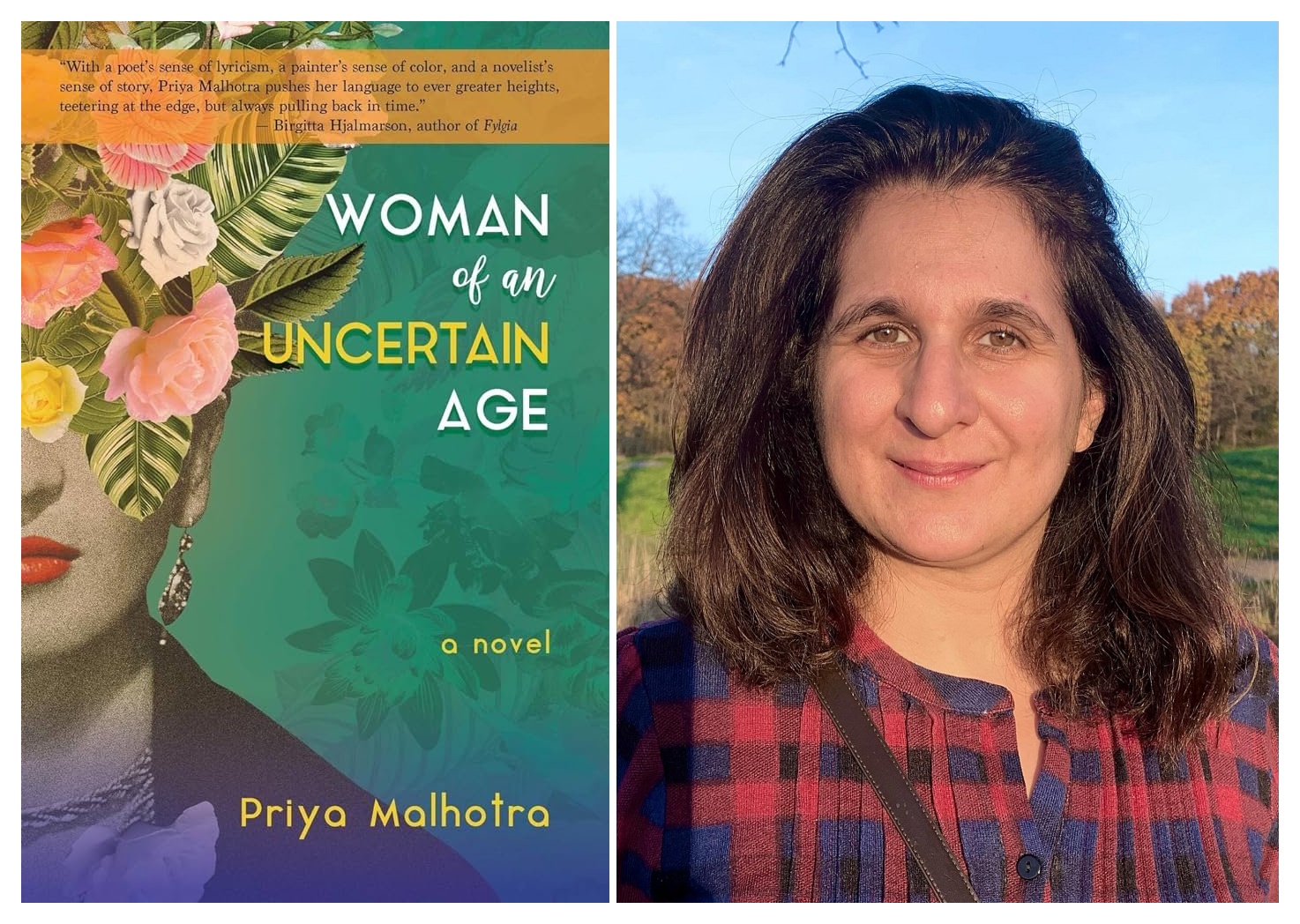
So happy to read this article 🥰👍🏻
Thank you so much for reading 🙂
An absolutely relevant and thought-provoking insight into an Indian woman’s mind. I loved reading this interview with Priya and understanding what she thought of as she spun this tale. This must be happening to many-not necessarily in only the US. Even at home here similar stories abound. It is also true for many men who get a chance to revisit what they want from their life and relationships if they get widowed or separated. Am looking forward to reading this book. Congratulations to Priya Malhotra.
What an intriguing premise! I like that the author examines the complexity of the situation of a “woman of an uncertain age” rather than making it a linear story. I hope to read the book soon! Great interview @Shikha Lamba
Thank you so much Priya. We have a book giveaway, where we are giving away a signed copy of the book.